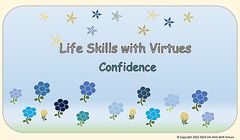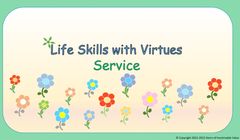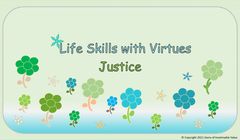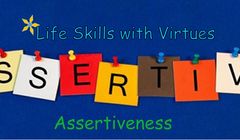Why you should teach soft skills in your homeschooling
Why soft skills are crucial for kids, how they contribute to future success, and how to make sure you teach them.
You set the stage for your homeschooling experience. So you have the freedom to educate your children as whole people instead of solely focusing on academics. As a parent, you’ve most likely been working on building soft skills since your child’s birth.
For instance, maybe you’ve taught your kids how to complete a morning checklist of personal hygiene tasks, how to put a difficult puzzle together, or how siblings can work together to clean up the pile of toys on the floor. Time management, problem-solving, and teamwork—are all considered soft skills.
In this article, I’ll discuss why soft skills are crucial, how they contribute to children’s future success, and tips for weaving soft skills into home education.
Why soft skills are a key life skill
Soft skills are also called social-emotional skills. For over 100 years, these skills have proven to be more important than hard skills in terms of education and vocation.
According to research conducted by Harvard University, the Carnegie Foundation, and Stanford Research Center in 1918, “85% of job success comes from having well-developed soft skills and people skills, and only 15% of job success comes from technical skills and knowledge (hard skills).”
Soft skills include, but are not limited to:
Teamwork
Problem-solving
Time management
Adaptability
Resourcefulness
Openness to criticism
Conflict management
You may be thinking, “Wait, a lot has changed in 100 years in terms of the job market and the hard skills professionals need.” Yes, a lot has changed. However, technological change has not overridden the necessity of soft skills. In fact, it’s possibly made them more imperative.
Take a look at these points from the article, The Value of Soft Skills in the Labor Market:
Social interaction is perhaps the most necessary workplace task for which there is currently no good machine substitute.
Across all industries and occupations, job design has shifted away from rigid categorization and toward increased job rotation and worker multitasking.
Machines are better than humans at performing routine, codifiable tasks according to a set of explicit rules. However, people are still much better at open-ended tasks that require flexibility, creativity, and judgment.
Traditional education has left soft skills development up to the parents because quantifiable results like grades and test scores are easier to track. Some traditional schools are incorporating soft skills into their programs based on research; however, it’s still an ongoing battle to implement on a large scale.
As parents and educators, you don’t have to choose between one or the other. You can incorporate soft skills into your daily learning; much like Melissa, a fellow homeschool parent, does in her home.
Because once a child leaves the nest, soft skills are the glue that will keep them together through the ups and downs of life. Although skills of determination, resilience, and adaptability aren’t easily measured on tests, research continues to show they are critical for success in life.
How soft skills contribute to the future success of our children
As parents and educators, we want our children to be fully prepared and successful in their future careers. According to Ian Siegel, ZipRecruiter Co-Founder and CEO, soft skills are not overlooked within hiring departments, and they can actually make up for those lacking specific hard skills.
"93% of employers say soft skills play a critical role in their decision about whom they want to hire,” writes Seigel in his book Get Hired Now. “Those soft skills include things like showing up on time, willingness to learn, enthusiasm, and a can-do attitude.”
By nurturing our children’s soft skills, we not only prepare them to get jobs, but we also prepare them to properly handle the ups and downs of any work environment. An example that comes to mind comes from Mr. Chazz’s Instagram page.
Mr. Chazz is an educator and coach to parents and teachers who regularly shares parenting advice about raising the whole child. In this Instagram post, he writes:
The skills you’re learning and teaching as a parent are absolutely transferable to the workplace. The way we treat children is the way they will treat others.
I’ve seen it a million times. I’ve seen people in the workplace who struggle to express their emotions in a healthy and productive way…Problems don’t get solved, and often more problems are created. This happens in parenting, teaching, and leadership. And it will continue to happen if parents, teachers and leaders don’t learn/teach the skills.
Aside from the workplace, people who develop soft skills thrive in their everyday lives throughout childhood and adulthood. We use communication, problem-solving, critical thinking, etc., daily within our homes, communities, and relationships. It’s another reason why soft skills contribute to the future success of our children.
Academic skills are crucial, yet research shows they’re not the #1 factor for predicting kids' success. When we teach children how to learn, not just what to learn, they’re empowered to grow and thrive.
Tips for nurturing soft skills throughout homeschooling
Historically, soft skills quizzes or assessments have not been developed nearly as much as intelligence tests, such as the IQ test. Due to this fact, there’s no “test” to discover which soft skills are strongest or weakest in your children.
The process has a lot to do with following your instincts as you raise your children and help guide their education.
Since soft skills are directly correlated with improved learning, it’s our responsibility to help our children achieve them for the sake of their education, professional careers, and life in general. If that feels like a huge weight on your shoulders, don’t worry!
We can nurture these imperative skills throughout the homeschooling journey in the following ways:
Build up the core emotional intelligence (EQ) skills first
So if we want our children to be successful they need both academic skills and soft skills. But before they master the latter, they need emotional intelligence (EQ).
According to the National Soft Skills Association, for children to master soft skills, first they have to have the four core EQ competencies, including: self-esteem, interpersonal awareness, empathy, and a supportive environment.
1. Take it slow while focusing on the journey
Children don’t develop soft skills in one day, just like they don’t learn to read in one day. Children’s confidence is built up with repetition and continuous practice.
Throughout your family’s journey, there will be plenty of time to assess which soft skills need to be developed and where they’ve made progress. It will be a continuous process, just like learning is continuous.
2. Teach with intentionality and use great resources
You don’t have to nurture your children’s soft skills all on your own. There are plenty of resources, such as online classes, books, podcasts, and more.
For example, Outschool provides engaging and fun group or one-on-one online classes that help children develop soft skills, such as:
Some books that come to mind that can help parents and educators include:
Julie Bogart’s Raising Critical Thinkers
Dr. Daniel J. Siegel’s The Whole-Brain Child
John Holt’s How Children Learn
When developing soft skills in your children, be innovative. There isn’t a “right way” to do it. You get to be creative. When the process is meaningful and authentic, it’s more fun for you and your kids.
3. Model a growth and learning mindset
We know the benefits of modeling a growth and learning mindset when it comes to fostering passion-led and interest-based learning. But it can also benefit children’s development of soft skills.
For example, I noticed I didn’t have the best stress management. When I was stressed about a looming writing deadline in the midst of homeschooling, parenting, and daily life, I would get very on edge. This was a weakness of mine. However, recently I’ve been learning to deal with stress, alongside my 7-year-old daughter, by modeling breathing exercises, open communication of needs, and better time management.
It’s important to show our children that we may not ourselves have perfect social-emotional skills, but we can work on them. Assess your own areas of strength and weakness, and be willing to learn alongside your kids.
Key takeaways
The bottom line is you’ve probably been teaching your children soft skills since the day they were born. But as parents, we can always be more intentional. Remember, it’s not just about grades and academics.
If you want your kids to be successful, think about how you can help them master skills like problem-solving, critical thinking, stress management, and adaptability. These are the competencies that build resilience, and research shows are the best predictors of success.
You also don’t have to do it alone. Partner with family, friends, and additional educators. Outschool is a great place to start. You’ll find classes designed to help grow your kids' EQ and soft skills like:
Sometimes the greatest gift we can give our children isn’t helping them achieve the perfect test score or GPA; it’s preparing them for everything else that life will throw at them.

Topics Related to Life Skills
Similar Life Skills articles
Life Skills classes


1-on-1 Tutoring


1-on-1 Tutoring





